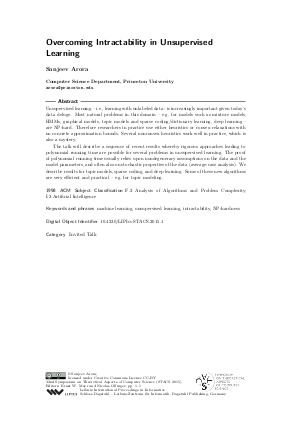Overcoming Intractability in Unsupervised Learning (Invited Talk)
Author Sanjeev Arora
-
Part of:
Volume:
32nd International Symposium on Theoretical Aspects of Computer Science (STACS 2015)
Part of: Series: Leibniz International Proceedings in Informatics (LIPIcs)
Part of: Conference: Symposium on Theoretical Aspects of Computer Science (STACS) - License:
 Creative Commons Attribution 3.0 Unported license
Creative Commons Attribution 3.0 Unported license
- Publication Date: 2015-02-26
File

PDF
LIPIcs.STACS.2015.1.pdf
- Filesize: 354 kB
- 1 pages
Document Identifiers
Subject Classification
Keywords
- machine learning
- unsupervised learning
- intractability
- NP-hardness
Metrics
- Access Statistics
-
Total Accesses (updated on a weekly basis)
0PDF Downloads0Metadata Views
Abstract
Unsupervised learning - i.e., learning with unlabeled data - is increasingly important given today's data deluge. Most natural problems in this domain - e.g. for models such as mixture models, HMMs, graphical models, topic models and sparse coding/dictionary learning, deep learning - are NP-hard. Therefore researchers in practice use either heuristics or convex relaxations with no concrete approximation bounds. Several nonconvex heuristics work well in practice, which is also a mystery. The talk will describe a sequence of recent results whereby rigorous approaches leading to polynomial running time are possible for several problems in unsupervised learning. The proof of polynomial running time usually relies upon nondegeneracy assumptions on the data and the model parameters, and often also on stochastic properties of the data (average-case analysis). We describe results for topic models, sparse coding, and deep learning. Some of these new algorithms are very efficient and practical - e.g. for topic modeling.
Cite As Get BibTex
Sanjeev Arora. Overcoming Intractability in Unsupervised Learning (Invited Talk). In 32nd International Symposium on Theoretical Aspects of Computer Science (STACS 2015). Leibniz International Proceedings in Informatics (LIPIcs), Volume 30, p. 1, Schloss Dagstuhl – Leibniz-Zentrum für Informatik (2015)
https://doi.org/10.4230/LIPIcs.STACS.2015.1
BibTex
@InProceedings{arora:LIPIcs.STACS.2015.1,
author = {Arora, Sanjeev},
title = {{Overcoming Intractability in Unsupervised Learning}},
booktitle = {32nd International Symposium on Theoretical Aspects of Computer Science (STACS 2015)},
pages = {1--1},
series = {Leibniz International Proceedings in Informatics (LIPIcs)},
ISBN = {978-3-939897-78-1},
ISSN = {1868-8969},
year = {2015},
volume = {30},
editor = {Mayr, Ernst W. and Ollinger, Nicolas},
publisher = {Schloss Dagstuhl -- Leibniz-Zentrum f{\"u}r Informatik},
address = {Dagstuhl, Germany},
URL = {https://drops.dagstuhl.de/entities/document/10.4230/LIPIcs.STACS.2015.1},
URN = {urn:nbn:de:0030-drops-49581},
doi = {10.4230/LIPIcs.STACS.2015.1},
annote = {Keywords: machine learning, unsupervised learning, intractability, NP-hardness}
}
